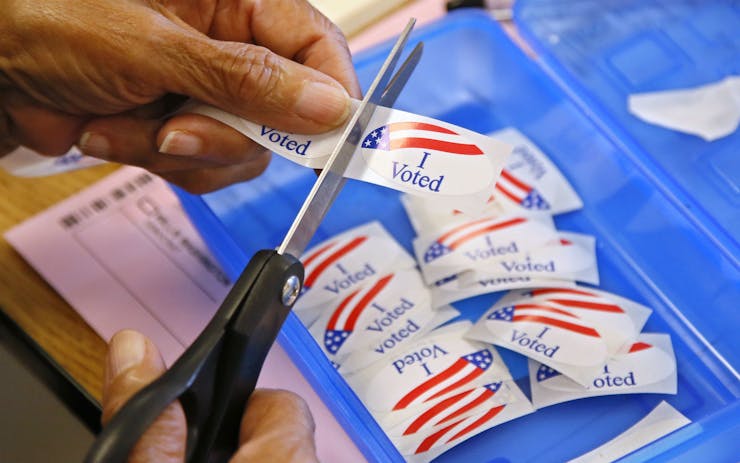Voters in Oklahoma appear to have passed one of the nation’s most permissive medical marijuana laws in the nation, becoming the 30th state to legalize cannabis for medical use.
The Associated Press called the race shortly after 9:20 p.m. local time Tuesday night. With 1,591 of 1,951 precincts reporting according to the state election board, State Question 788 led at the ballot box, 56.3%–43.7%.
Oklahoma voters approve medical marijuana in first state ballot question of 2018 on cannabis. https://t.co/5WBrG7bjtn
— AP Politics (@AP_Politics) June 27, 2018
When the dust cleared Wednesday morning, with all precincts reporting, the election board reported that the measure had been approved by an even wider margin: 56.84%–43.16%.
The measure, which legalizes the cultivation, possession, and use of medical cannabis by qualified patients, was the result of an activist-led signature drive launched more than two years ago. It drew heavy criticism from law enforcement, business, medical, and church leaders, but as the election approached, polls suggested that most Oklahomans supported the measure.
The conservative state has long elected law-and-order politicians, but in recent years voters have begun to loosen penalties for nonviolent drug-related crimes. Two years ago, state voters passed a measure to reduce all criminal penalties for drug possession to be misdemeanors despite pushback from law enforcement and other groups.
The new medical marijuana law is particularly noteworthy in that it gives doctors wide leeway in determining what conditions qualify for cannabis use. With no explicit qualifying conditions listed in the bill, doctors would be able to recommend medical cannabis “according to the accepted standards a reasonable and prudent physician would follow when recommending or approving any medication,” according to the measure.
Critics have complained that such open-endedness would effectively legalize cannabis.
The new law allows licensed patients to possess up to three ounces of cannabis on their person and up to eight ounces at home.
“I think it’s not written right,” Connie Givens, a 67-year-old Republican in Oklahoma City, told the Associated Press as the election approached. “I think it’s just so people can get marijuana.”
But pollster Bill Shapard noted that the measure has earned broad support even among more conservative voters.
“I’ve found almost half of all Republicans support it, so that’s going to take an awful lot of money and an awful lot of organized opposition for this to lose on Election day,” he said.
Shop highly rated dispensaries near you
Showing you dispensaries nearAmong supporters, there was a variety of reasons for approving the measure. “I’ve never messed with any drugs, marijuana or anything like that,” Jack Hodgkinson, a Vietnam veteran and supporter of Donald Trump, told the AP. “But if it helps people who need it, I’m all for it.”
Robert Pemberton, 58, said he supported legalization for tax reasons, saying he believed it’s been beneficial in states that currently tax and regulate cannabis.
“They’ve got excess money, and we need that, especially for our teachers,” he said. “I think we need the revenue from it. I think we need the money. Our state’s in trouble financially and I think it would really help.”
Late in the campaign, an opposition group called SQ 788 Is Not Medical dropped a reported $500,000 on a media blitz aimed at defeating the measure. The group’s chairman, Dr. Kevin Taubman, called the measure “a bad public health policy that does not resemble a legitimate medical treatment program.”
Earlier this year, the state Legislature had the opportunity to set further restrictions on the state’s would-be medical cannabis program, but lawmakers failed to pass legislation. Gov. Mary Fallin, a Republican, said prior to Tuesday’s vote that if the measure were to pass, she would call for a special legislative session in order to establish a regulatory framework for the new program.
As written, the new law would allow licensed medical marijuana patients to possess up to three ounces of cannabis on their person and up to eight ounces at their place of residence. In addition patients could have up to six seedling plants and six additional mature plants, one ounce of cannabis concentrates, and up to 72 ounces of edible cannabis products.
Even for patients who fail to obtain a license, the law may loosen criminal penalties for possession. Someone without a valid medical marijuana license found in possession of up to 1 ½ ounces of cannabis would face a misdemeanor charge with a maximum fine of $400 so long as they can “state a medical condition,” the law says.
Voters cast ballots in droves in the early voting period that ended Saturday, with enthusiasm particularly high among Democrats. Oklahoma Election Board Secretary Paul Ziriax said nearly 31,000 registered Democrats voted early ahead of Tuesday’s elections, more than twice the 14,100 who voted early in 2014.
Early-voting turnout was sharply higher for Republicans, too. Ziriax said about 36,600 Republicans voted early this year, compared to about 21,600 in 2014.
A few hiccups emerged after polls opened at 7 a.m. Tuesday. In Tulsa, some voters cast their ballots out of the back of a poll worker’s SUV when no one arrived to unlock the precinct’s door. Other locations opened late for the same reason.
According to local news reports, some voters complained of getting ballots that did not include State Question 788. Election officials said the claims were completely false, adding they’ve checked ballots at every polling location. “It’s been all over the county, there’s been a couple of repeat places, but we have confirmed with those places and sent technicians out to confirm ballot counts are matching,” a Tulsa County Election Board employee told Tulsa-based television outlet News On 6.
This story has been updated.
The Associated Press contributed to this report.






